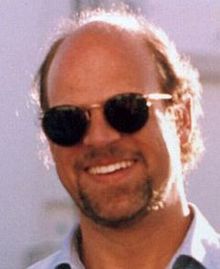R. Paul Butler

Robert Paul Butler (born 1960) is an astronomer who searches for extrasolar planets. As of November 2020,[update] he and his team have discovered over half of the planets found orbiting nearby stars. He is also noted for his pioneering work in Doppler spectroscopy, a method used to detect stars having orbiting planets by measuring the "wobble" induced by the gravitational forces between the star and its orbiting planet(s).
Early life and education
Butler was born in April, 1960 in San Diego, California. Even as a boy, he was interested in astronomy. When he was 14, he built an 8-inch reflector telescope and began looking at planets and stars. He was fascinated by early astronomers and cosmologists like Galileo and Giordano Bruno, who dared to speculate about multiple worlds at a time when such ideas were considered heresy.[1] As a high school student in 1977, he learned techniques of orbit calculation when he attended the Summer Science Program at his school.[2] He went on to receive a BA (physics, 1985), a BS (chemistry, 1986) and an MS (physics, 1989) from San Francisco State University. He completed his Master's thesis with Geoffrey Marcy in 1989, and received his Ph.D. in astronomy in 1993 from the University of Maryland College of Computer, Mathematical, and Natural Sciences in College Park, Maryland, where his graduate work focused on the design of a very sensitive spectrograph, used to detect extrasolar planets by detecting variations in the radial velocity of their parent stars. Since 1999, he has been a staff scientist at the Carnegie Institution for Science.[3]
Awards
In 2001, Butler and Marcy were awarded the Henry Draper Medal from the National Academy of Sciences.[4] He was named Discover Magazine's "Space Scientist of the Year" in 2003.[5]
See also
References
- ^ DAgnese, Joseph (November 8, 2003). "Space Scientist: Geoff Marcy and Paul Butler". Discover Magazine (Online). Retrieved November 9, 2020.
- ^ Overbye, Dennis (May 12, 2013). "Finder of New Worlds". New York Times (Online ed.). Retrieved May 13, 2014.
- ^ "R. Paul Butler, Staff Scientist". Carnegie Institution for Science, Earth and Planets Laboratory. Retrieved November 10, 2020.
- ^ "Henry Draper Medal". National Academy of Sciences. Retrieved November 7, 2020.
- ^ "Discover Awards: The 14th Annual Discover Magazine Awards for Innovation in Space Science and Technology". Discover Magazine (Online). November 2003. Retrieved November 9, 2020.
External links
- "Five Out of Five Researchers Agree: Earth's Solar System Special", Sara Goudarzi, space.com, 31 March 2005
